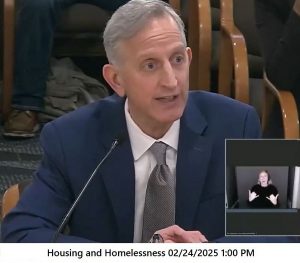Portland chooses a path forward on homelessness
4 min read
by Marty Wilde
What should be the first step in getting people off the streets: supported camping, emergency shelter, or housing?
The debate between shelter-first and housing-first advocates has dominated Portland politics for the last four years, obstructing progress on either goal. Portland voters resolved the debate firmly on the side of shelter with the election of Keith Wilson as mayor.
Shelter versus housing. Shelter is generally defined as a place that provides temporary protection from the elements. In contrast, housing provides a place of permanent refuge.
Housing-first advocates usually argue that a temporary respite does nothing to solve the underlying issues that drove a person to homelessness, making the temporary solution of shelter a permanent one. Shelter-first advocates say that the greater cost and time to construct housing leaves people cold and hungry today.
Retail businesses and those with downtown offices have mostly supported shelters, as unsheltered homeless people create negative perceptions of business districts and detract from their ability to bring customers. Similarly, law enforcement interests support shelter, because it more speedily reduces the public order issues that unsheltered homelessness creates.
A vision of shelter for Portland. Mayor-elect Wilson’s first priority is to provide Portland’s roughly 4,000 unsheltered people with emergency, night-only shelters in existing businesses and nonprofits. Using a model similar to Egan Warming Centers, which open only in below-freezing weather, the Portland program would offer people shelter across the city year-round on an emergency basis.
The mayor-elect proposes to pay for the proposal by redirecting $25 million of the $300 million the city currently dedicates to services for the unsheltered. Mr. Wilson noted that the cost of low- and medium-barrier shelters runs about $16.30/night, versus almost $190/night for the existing transitional alternative shelters in Portland.
Over time, these night-only shelters would be supplemented with day shelters, prevention services, homeless court programs, and the rapid construction of low-income housing. His plan proposes to add 2,000 shelter beds within the first year.
More controversially, Mr. Wilson proposes to end Portland’s programs for handing out tents and tarps to the unhoused and, eventually, to enforce anti-camping laws. He has been clear that enforcement is not his first priority and will have to wait until beds are established. Nevertheless, the potential move away from entirely optional shelter to enforced shelter has many critics.
When I served in the Legislature, we were considering then-Speaker Tina Kotek’s bill to require local government enforcement of anti-camping ordinances to be objectively reasonable in light of the available shelter beds. She disagreed with me that it would ever be appropriate in the future to move people off the streets through the use of law enforcement, regardless of the number of shelter beds available. (Please leave open the possibility that I misunderstood her or that her views may have changed.)
Mr. Wilson’s plan reflects the clear desire of downtown residents and businesses to remove homeless encampments and prevent people from sleeping on the sidewalks.
Obstacles on the horizon. Setting aside the issue of enforced compliance, Portland’s shelter plan has a number of unresolved questions.
Temporary night shelters often rely on volunteers (as Egan does), rather than paid staff. Shifting temporary shelters to full-time ones will require a substantial outlay of funds to pay for staff. Further, while businesses and nonprofits may volunteer space, the reality is that temporary shelters tend to be rather hard on the buildings that host them, which is another driver of increased costs.
Previous plans have also focused on large congregate shelters to reap economies of scale. However, the mental health and substance abuse problems of many of the unhoused make big shelters impractical, as more is definitely not merrier when some people want to sleep and others are unable or unwilling to keep it quiet.
Finally, while most people support sheltering the unhoused, few want a shelter in the building next door.
In fairness to Mr. Wilson, these are solvable problems. The federal government does virtually nothing to pay for supported camping and does fund shelter, making it unlikely to be effective in shifting Portland’s priorities. The state government has been willing to waive zoning requirements for shelters in the past.
At Egan, in our largest sites, we seek to have separate sleeping and “awake” rooms to minimize conflicts. The staff and damage issues do drive cost, but the existing homeless support programs are often quite expensive because of their novelty and lack of scale.
Doing the math, $300 million/year for 4,000 people works out to $75,000 each, a sum of money more than adequate to provide basic shelter. Further, Mr. Wilson has claimed that private donors have offered to supply the $25 million necessary for the initial effort, perhaps allowing the program to get off the ground and postponing the inevitable budget battle for a year.
Moving forward. Portlanders’ resolve to tackle the problem of unsheltered homelessness is undermined somewhat by the limited role of the mayor in their new system. Instead of the past “strong mayor” system, Portland will now have a more traditional weak mayor system with a strong council and city manager.
Put bluntly, the mayor-elect’s authority comes more from the support of the electorate and the use of the bully pulpit than his actual authority within the city government.
Nevertheless, his public mandate is a strong one, as voters firmly rejected candidates who favored a housing-first approach, as well as those who favored an enforcement-first approach. Mr. Wilson has his mandate for shelter-first. Now he has to deliver.
Image of Portland Mayor-elect Keith Wilson and Portland Street Response courtesy Keith Wilson for Mayor campaign.
Marty Wilde represented central Lane and Linn counties in the Oregon legislature. For more of his Letters From a Recovering Politician, subscribe at https://martywilde.substack.com/subscribe.







